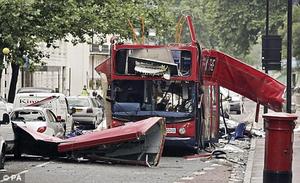7/7 London attacks7/7 attacks could not have been prevented: report
An inquest into the 7 July 2005 attack on London transportation concluded that any suggestion MI5 could have stopped the attacks was “based to a considerable extent on hindsight”; there were failures in the response by emergency workers — confusion, a shortage of first aid supplies, and radios that did not work underground, but the report concludes that government errors had not increased the death toll

One of the London 7/7 targets // Source: starcentralmagazine.com
A new report released last week into the 7/7 attacks on London transportation – “Coroner’s Inquest into the London Bombing of 7 July 2005” – says that software problems made it difficult for MI5 to investigate the 7 July 2005 attacks.
AP reports that Heather Hallett, the coroner in charge of the inquest, raised questions with MI5 about the computer systems used to monitor Mohammad Siddique Khan and his associates. Khan appeared in footage taken at a terrorist training camp in 2001 and was monitored on four separate occasions in 2004, but this only came to light after the bombings.
“Witness G,” the chief of staff to Jonathan Evans, MI5’s director general, told the inquest “‘it can be very difficult’ to ‘dig into’ the files and computer systems at the Security Service to try to find out if a particular person has previously come to their attention,” adding that the difficulty was the result of the large number of people with the surname Khan. Even using the name Siddique Khan “may not produce helpful results,” says Hallet.
Hallett concluded that the commuters were “unlawfully killed in a dreadful act of terrorism” by the four bombers and said that no “failings on the part of any organization or individual caused or contributed to any of the deaths.”
Hallett said any suggestion MI5 could have stopped the attacks was “based to a considerable extent on hindsight.”
There were also failures in the response by emergency workers — confusion, a shortage of first aid supplies, and radios that did not work underground. Hallett said, however, that government errors had not increased the death toll. “I am satisfied on the balance of probabilities that each of them would have died whatever time the emergency services had reached and rescued them,” she said.
